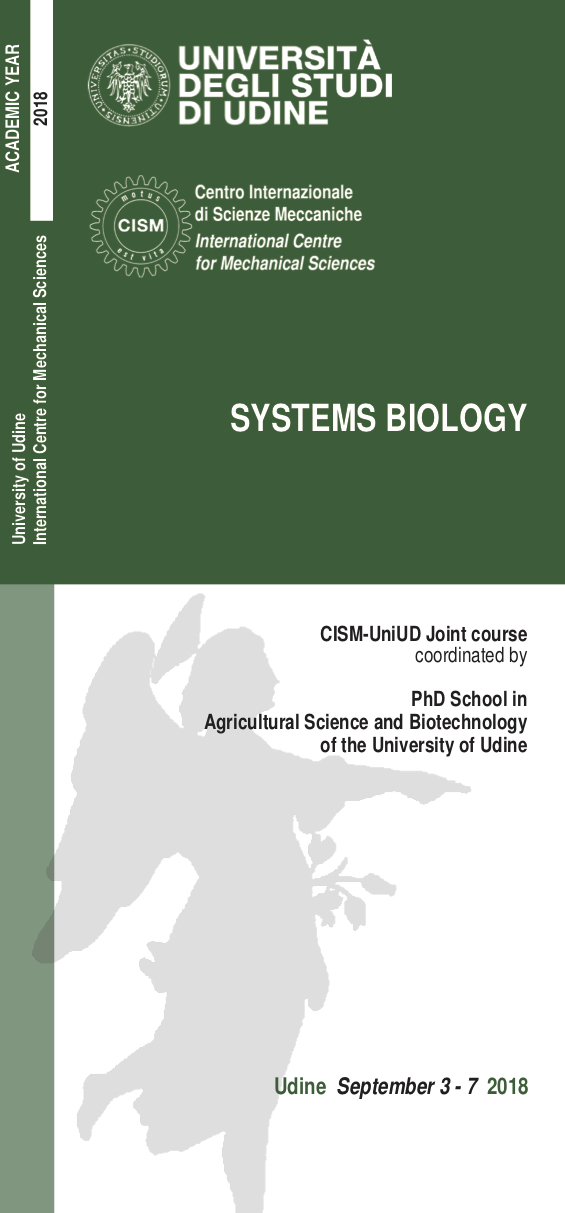Systems biology deals with the interdisciplinary study of complex biological systems and exploits a holistic approach to unravel the network of interactions connecting the components of those systems, being them genes in a transcriptome, cells of an organism or members of a microbiota.
This introductory course will provide a general overview of the approach, and the analytical methods that are commonly used in this field.
During the week, five leading scientists in the study of cellular interactions, population dynamics, and the biome, will explain the significance of systems biology in their field, will discuss case studies, and will provide the attendees with practical example on how to test the methods they have just learnt.
At the end of the course, participants should be able to:
- see with new eyes the biological problems they normally deal with;
- understand the methods applied to the study of these problems;
- grasp the content of the primary literature dealing with this subject, in order to find inspiration for their work;
- profitably interact with mathematicians and modelers working in this field;
begin working in the field, if they wish.
The course is organized by Guido Cipriani, Giuseppe Firrao, Rita Musetti, Francesco Nazzi, and Mauro Spanghero for the PhD school in Agricultural Science and Biotechnology of the University of Udine, Department of Agricultural, Food, Environmental and Animal Sciences (Di4A).
TOPICS
The Physics of Living Systems
Samir Suweis (Department of Physics and Astronomy, University of Padua)
Understanding a living system is a formidable many-body problem and the study of living systems represents a fantastic challenge for physicists. In the last decades scientists have unveiled several macroscopic patterns, emerging from ecological and biological systems self-organization, that show a surprising simplicity reminiscent and that may represent a signature of the “universality” of the processes underlying biological evolution. Indeed, physics is providing powerful theoretical tools and incentivizing innovative steps towards the comprehension and the synthesis of broad empirical evidences of patterns on both spatial and temporal scale in biological systems. In my lectures I will present a physicist view of system biology (and ecology), focusing on some real case examples and showing the key ingredients one needs to incorporate in models so to reproduce the known emergent patterns.
Samir Suweisearned a doctorate in Environmental Engineering at the Ecole École Polytechnique Fédérale de Lausanne in 2011. After a visiting period as a researcher at the University of Princeton (NJ, USA), since 2012 he works in the Laboratory of Interdisciplinary Physics at the Physics and Astronomy department, University of Padua, where he holds the position of research scientist (RTDa). His research work is at the interface between ecology, environmental science and biology using theoretical framework provided by the physics of complex systems
Algorithms for Biological Networks
Ahmed Mahfouz (Computational Biology Center at Leiden University Medical Center, Leiden)
Molecular biology is concerned with the study of the presence of and interactions between molecules, at the cellular and sub-cellular level. In bioinformatics and systems biology, algorithms and tools are developed to model these interactions, often as networks or graphs, to derive biological knowledge. Professor Mahfouz will give an overview of biological networks and their properties, how to construct them from high-throughput measurements, and how to mine networks for biological knowledge. Next, Professor Mahfouz will summarize the role of systems biology and gene networks in improving our understanding of brain function and disease. We will have a hands-on practical session to try out some network analysis tools.
Ahmed Mahfouz is an Assistant Professor in the Computational Biology Center at Leiden University Medical Center in Leiden, The Netherlands and a guest researcher at the Brain and Mind Research Institute at Weill Cornell Medicine in New York. Ahmed's work focuses on understanding the molecular basis of brain function and diseases through network and machine learning approaches.
From Systems Biology to Systems Genetics of Root Growth
Wolfgang Busch (The Salk Institute for Biological Studies, La Jolla)
The Arabidopsis root has been at the forefront of plant systems biology for more than a decade. Functional genomics at the cell-type scale has enabled understanding how gene networks are dynamically orchestrated during development and stress response in a complex organ. Professor Busch will outline fundaments, findings and applications of root systems biology and the emerging area of root systems genetics, as well as host a practical session with hands on training on a relevant approach.
Wolfgang Busch is Associate Professor in the Plant Molecular and Cellular Biology and Laboratory, as well as the Integrative Biology Laboratory at the Salk Institute for Biological Studies in La Jolla, California. Dr. Busch’s work focuses on understanding which genes, genetic networks, and molecular processes determine root phenotypes. For this, his laboratory exploits natural genetic variation and uses a systems genetics approach that combines large-scale phenotyping, genome wide association studies, genetics, and genomics to find and characterize genes, their alleles, and the genetic networks that ultimately determine root growth.
The Use of Systems Biology Approaches in Nutrition and Animal Health Science
Qendrim Zebeli (University of Veterinary Medicine, Vienna)
Prof Zebeli will give an overview of the system biology approaches used in animal sciences. The focus will especially be on the use of transcriptomics, proteomics and metabolomics approaches in cattle research. The introduction of the system biology a few decades ago has revolutionized animal sciences and health. Instead of the old paradigm "one parameter one disease", systems biology provides a much deeper view of the interactions occurring in the body, advancing our knowledge in understanding processes that before were unreachable, and also prevent and treat animals more efficaciously.
Qendrim Zebeli is professor of Animal Nutrition at the University of Veterinary Medicine Vienna. Prof Zebeli has a strong interests in using systems biology approaches to elucidate the role of nutrition on animal health and smart prevention.
Metagenomic Techniques Used to Study Gut Microbiome: Case Studies
Barbara Metzler-Zebeli (University of Veterinary Medicine, Vienna)
The microbiome research of the last years has revealed that microbes can beneficially affect the host but also still there are challenges especially in properly using the bioinformatic information generated to advance the current knowledge. Dr. Metzler-Zebeli will provide details of her research and methods used for studying the gut microbiome both at phylogenetical and functional level. She will also show examples from her research how the diet affects the microbiome and also discuss pitfalls in data mining and coordination.
Barbara Metzler-Zebeli is a senior Lecturer at the University of Veterinary Medicine Vienna. Barbara has a strong international reputation in studying gut microbiome of animals using various OMICS technologies and data-processing tools.

